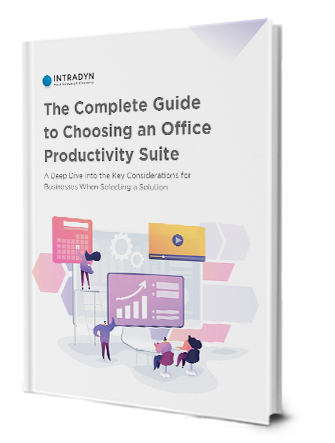8 Workspace (G Suite) Alternatives You Seriously Need to Check Out

Whether your business is small, large or somewhere in between, it’s likely made up of many moving parts that need to work together like a well-oiled machine in order to succeed. For most organizations, that requires investing in a team collaboration and productivity suite that enables different departments to easily share information, communicate with each other, streamline workflows and stay on track with project goals.
Google Workspace — formally G Suite — was launched with those exact goals in mind, and has delighted millions of business users with its robust feature set, secure third-party email hosting and 99.9% Service Level Agreement for covered services, but a recent price increase has led some customers to take their business elsewhere.
Are you considering making the switch from Google Workplace to something more affordable? Check out our list of Workspace alternatives to kickstart your search.
Rackspace
As a U.S.-based managed cloud computing company with offices around the world, Rackspace offers the same global scale as the Google Workspace at a fraction of the cost. Rackspace Webmail, the company’s premier email hosting platform, is designed to provide affordable web hosting services for small businesses. As with every Workspace alternative on this list, users might find Rackspace Webmail’s feature set to be limited compared to Google’s. But what Rackspace Webmail lacks in features, it makes up for with 25 GB mailboxes, 50 MB attachments (twice the size of Workspace’s), Microsoft Outlook integration, a 100% uptime guarantee and more.
Price: Basic package starts at $2.99/user/mo.
Users Say …
“Rackspace allows us to control numerous aspects of our service that we couldn’t before. For example, I disabled access over non-secure channels requiring everyone to use SSL/TLS when checking email. We did lose our personalized/branded webmail portal and URL, but since this is an internal system only (no customers see it) that wasn’t a big concern. The upside of that loss is that we have smoother connections to secure services without having to purchase a certificate.”
Slack
Since its initial release in April 2013, Slack has become one of the most-used team collaboration software tools in the world. And with an intuitive user interface (UI), an application directory featuring over 1,500 apps, video call functionality and robust security features, it’s easy to see how Slack was able to unseat HipChat, Campfire and a slew of other competing team chat apps. Although Slack lacks the feature set to compete with Workspace across the board, it is a formidable opponent to Google’s Hangouts Chat and Hangouts Meet apps. And, for readers who ultimately decide against switching to a Workspace alternative, you can still enjoy the benefits of Slack thanks to Workspace’s recently released Slack integration.
Price: Freemium (Free for small teams; Standard package starts at $6.67/user/mo., billed annually)
Users Say …
“Slack is so robust. You can send files, GIFs, video, have team video calls and create channels for your team to chat together. When sharing links, there is an option to display rich content previews, and you can even make your own emojis. The customization is endless. It is incredibly powerful even as a free version. Once I unlocked the paid version, having access to all of my archived files just took it to the next level. I highly recommend Slack for any size team and have used it for about 4 years.”
Zoho
Zoho offers an affordable Google Workplace alternative in the form of Zoho Workplace, an integrated online office application suite that includes a word processor, email hosting platform, web conferencing tools, chat functionality and more. Zoho Workplace can gain access to features such as 30 MB email attachments, unlimited organizations and private chat channels, 5 GB file upload for docs and even Workspace integration for free for up to 50 users, making it an excellent choice for small businesses; businesses with over 50 users can access all of these features and more through the Standard or Professional editions.
Price: Freemium (Free for up to 50 users; Standard package starts at $3/user/mo., billed annually)
Users Say …
“With a price tag of free, a minimalist user interface that becomes familiar after using it for only a short time, and the ability to optionally share documents amongst team members without sending them by email, Zoho Workplace puts group collaboration at the forefront of cloud-based work. With a Chromebook, a Windows system, a Macintosh, or even with an iPad or Android tablet, I can create and edit word documents, spreadsheets, and presentations online with ease.”
Samepage
True to its motto of “get more done when it’s all in one,” Samepage offers a collection of file sharing, task management and document collaboration tools all within a single solution, making it a viable Workspace alternative. Although it lacks email hosting functionality, Samepage does offer instant messaging, group and team chat, direct video and voice calls, shared calendars and a whole host of content, task and file management capabilities. Samepage is a cost-effective solution, too, offering a free starter edition for small teams and personal use that includes 2 GB storage and unlimited members, guests and teams.
Price: Freemium (Free for small teams and personal use; Pro package starts at $8/member/mo. when billed annually, $9/member/mo. when billed monthly)
Users Say …
“This tool succeeds at its role of allowing us to work together across multiple locations and projects. It delivers regular updates which [is] always good. The support team is really quick and effective in responding to any queries. It’s pretty easy to work with and understand. Its interface contains practical tips and guidelines. The desktop version is very easy to set up. It does not take excessive hard disk space. This software has a calendar function that makes it easy to view team events and tasks with deadline dates and, with a little help from Zapier, I can easily integrate Samepage with my other apps like Google Calendar.”
Dropbox
Dropbox made its name in the cloud storage market and has since expanded into the world of team management and collaboration. By consolidating all files within a secure, centralized repository, Dropbox Business makes it easy for team members to share files and folders, edit documents in real time, provide feedback and more, all from a single access point. Although Dropbox Business doesn’t offer the same full feature set as Workspace, it does go toe-to-toe with Google Drive for Business, making it the perfect alternative for organizations looking for affordable cloud storage.
Price: Dropbox Business Standard package starts at $12.50/user/mo.
Users Say …
“With a simple user interface, unlimited storage and file retrieval, and vast user permissions, Dropbox Business helps your team collaborate more efficiently. In fact, Dropbox boasts that 300,000 teams use Dropbox Business. To edit files online, you have to get a separate Microsoft 365 account, which can raise costs, or use Dropbox Paper, which isn’t fully integrated. For the best document management software, look to Editors’ Choice Zoho Docs Standard. But for an all-purpose, business class cloud storage and file sharing solution, Dropbox Business is an excellent solution and fully deserves the PCMag Editors’ Choice designation.”
Bitrix24
Built with small businesses in mind, Bitrix24 offers a full suite of capabilities, including:
- Social networking
- Web domain hosting
- Group chat
- Video conferencing
- Document collaboration
- Email hosting
- Human resource management
- Mobile portal
- And more
This Google Workplace alternative earns high marks for its cloud-based and on-premises implementation options; Bitrix24 also offers features that users can’t find in Workspace, such as project management and customer relationship management, making it an excellent choice for organizations that want all of the functionality of Workspace — plus a little extra.
Price: Freemium (Free for up to 12 users; Cloud Edition Standard starts at $79.20/mo. for up to 50 users; On-Premises Edition starts at $1,490 one-time fee)
Users Say …
“What I like about Bitrix24 is that I can manage projects while maintaining control of and monitoring the tasks assigned to the members of a project, in this case the development team. It also allows me to divide the members into different groups according to the strength of each member. It also has Chat to keep the group informed, contact management and many other features. Also, [it offers] support in real time through the most popular communication channels, such as social networks, messaging, telephony, email or live chat.”
Microsoft Office 365
Perhaps the most recognizable name on this list, Microsoft Office 365 has been one of the most popular productivity suites in the world since its release in June 2011 and is Workspace’s leading competitor. Office 365 offers an expansive feature set, including OneDrive for file storage and sharing, Teams for chat-based collaboration, Exchange for email hosting and SharePoint for web-based collaboration; Office 365 also integrates with other platforms within the Microsoft ecosystem, including Microsoft Dynamics. For the same price as Workspace Basic, Office 365 users can gain access to Exchange with 50 GB mailbox storage, 24/7 phone and web support, 1 TB of OneDrive file storage and more.
Price: Office 365 Business Essentials starts at $5/user/mo. with annual commitment
Users Say …
“We use Microsoft 365 Business to provide all of our basic office software solutions, including word processing, spreadsheets, presentations, email, cloud-based document management, etc. We moved to Microsoft 365 Business as a cloud solution to avoid having to upgrade individual laptops on a regular basis, provide our employees with access to licenses for multiple devices and eliminate the use of another third-party Exchange email provider. Microsoft 365 Business provided us better solutions and lowered our costs.”

